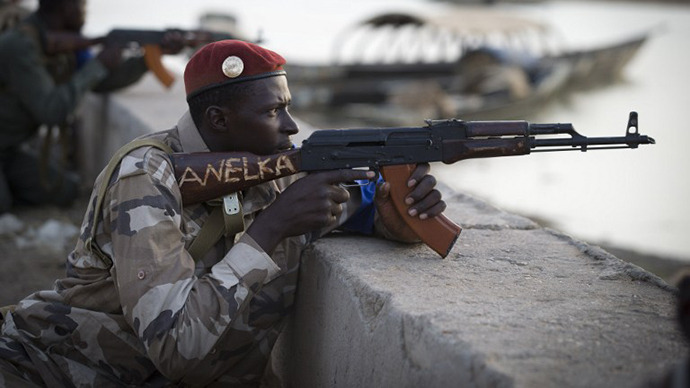‘EU should bombard Mali with material benefits rather than explosives’

Instead of offering real help to Mali the EU and the US are destabilizing the nation before ‘micro-managing the slaughter’ as was seen in Libya a couple of years ago.
Even some mainstream commentators have remarked that there seems to be a glaring mismatch between UK and French support for “Al Qaeda” in Syria just as their troops butcher Qatari and Saudi-backed “Al Qaeda” in the West African nation of Mali. Medecins Sans Frontieres reports that 100,000 are now displaced by the fighting. UNHCR said the violence could displace 700,000. And Mali's “Prime Minister” Diango Sissoko has announced that general elections will take place in July.
US President Obama has kept the conflict at arms-length, employing his favoured weapon of choice, the drone, to aid NATO-countries’ troops. The Pentagon sees the deployment of US ground troops to Niger as a better way to fight Chinese expansion in the region.
But it seems never to have occurred to him to ask why a country like Mali with such a rich intellectual and cultural history (their Islamic golden age was in the 15th and 16th centuries albeit with European slaves) should have deteriorated into such a brutal Salafist nightmare of Afghan proportions. Could it possibly be the legacy of the French colonialism that began in the late nineteenth century – and will Mali’s long-term future benefit from thousands of French troops tramping the scorched earth to back a dictator? And when the hi-tech drones make ‘mistakes’ as they always do, will communities in the North of the country be more or less likely to reach for teachings of Osama bin Laden?
While France’s hated President Francois Hollande tries to cope with corruption scandals and more than one in ten out of work, the French people are finding it difficult to access information on mainstream channels as to what is happening in Mali. The French military has kept journalists at least one hundred miles from the front lines and there are reports that they’re not allowed to take photos even when embedded. The secret services and military units of de facto NATO-backed Malian dictator, Dioncounda Traoré have beaten journalists and confiscated video material. French state broadcasting regulators have tried to ban images of the dead from reaching the eyes of the French taxpayer to keep this a ‘clean’ and ‘surgical’ war against what must be defined as anachronistic Islamists. No reporting of the campaign of torture and killing against the Tuaregs at the hands of NATO-backed Malian soldiers is to be permitted.
As for Malian journalists, the chief editor of the Malian newspaper Le Républicain, Boukary Ndaou, seems to have disappeared after he criticised the junta over corruption and war-crimes committed with French money. I’ve seen no grand statement from the African Union protesting his detention, though the African Assembly for the Defence of Human Rights has called for his release.
French media managers have been supine, telling their newsrooms that the actions of Hollande’s censors are understandable. Phil Chetwynd of Agence France Presse, reportedly said this was a “complex and dangerous conflict,” when justifying the totalitarian demands from the Elysee Palace. As for British media, news on Mali has centred on a quasi-apolitical notion of human rights interspersed with images of liberated towns genuflecting before French soldiers – all UK major parties support the intervention.
Germany, Europe’s economic superpower, is in Mali, too. It is aiding long-distance French bombers to refuel, air-to-air, with Bundeswehr tanker aircraft. Despite majority-opposition from the German people, politicians in Berlin are eager to involve themselves in the new scramble for Africa, decades after the Kaiser and Rommel. Italy, Belgium and Canada are also involved. Even Spain, in the depths of virtual economic collapse has the money to help in the war with boots on the ground. Future Islamist terrorists will remember the names of these countries.
The lie that the Mali operation is about upholding ‘human rights’ to destroy barbaric Islamists would be clear to a goldfish: it seems like yesterday that EU powers were funding Al Qaeda in the Islamic Maghreb and the Movement for Unity and Jihad in West Africa to fight Muammar Gaddafi in Libya. This consistent attempt at destabilising nations and then micro-managing the slaughter is an old story in what should be the richest continent in the world. What seems not to have occurred to the weapons-lobbied politicians of Europe is that using planes to bombard Mali with material benefits like food and medicine rather than explosives is the only long-term solution to salvaging a region that was once one of the world’s greatest symbols of humanity’s potential.
Afshin Rattansi, journalist and author of “The Dream of the Decade – the London Novels” is an RT Contributor. He can be reached at afshinrattansi@hotmail.com.
The statements, views and opinions expressed in this column are solely those of the author and do not necessarily represent those of RT.
The statements, views and opinions expressed in this column are solely those of the author and do not necessarily represent those of RT.













